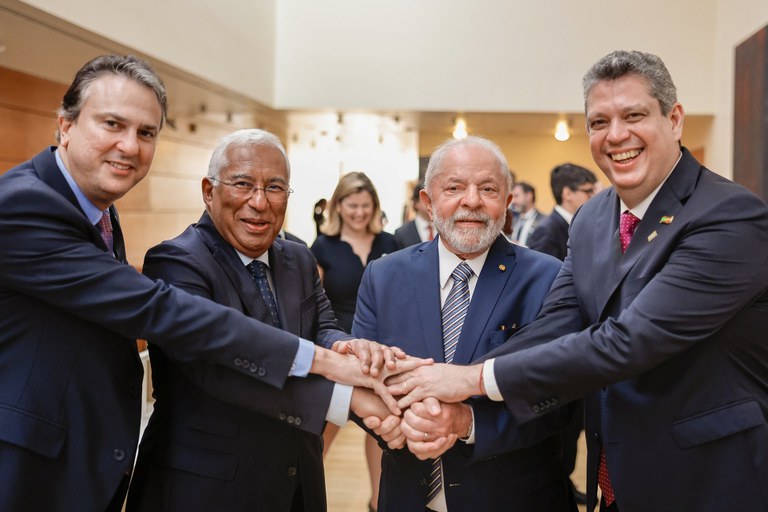Notícias
VISIT TO PORTUGAL
Brazil and Portugal sign agreement towards equivalence of primary and secondary education

Brazil’s Minister of Education, Camilo Santana, the Prime Minister of Portugal, António Costa, President Lula, and the Secretary General of the Presidency, Márcio Macêdo. PR/Ricardo Stuckert
Brazil’s President Luiz Inácio Lula da Silva and Prime Minister of Portugal António Costa presided Saturday (22) over the signing of 13 bilateral agreements, including one that establishes the equivalence of education carried out in Brazil (elementary and secondary school) and in Portugal (primary and secondary school).
The documents were signed in Lisbon after Lula and Costa took part in the plenary meeting of the XIII Luso-Brazilian Summit – the main bilateral meeting between the two countries – at the Belém Cultural Center.
“What we’ve done here today, with the health agreement, the education agreement, the agreement for people with disabilities, is a very noble thing in the relationship between Brazil and Portugal,” said the Brazilian president.
So as to strengthen the ties of friendship and cooperation between Brazil and Portugal and the common characteristics – involving language, identity, citizenship and cultural heritage – that unite them, this agreement establishes the bases for legal curricular equivalence for students from both countries in elementary and secondary education, in the case of Brazil, and primary and secondary education, for Portugal.
In this way, the countries seek to promote adequate integration towards continuing studies both in Brazil and Portugal. The agreement determines that equivalence of qualifications will be granted by taking into account the number of years of successfully completed schooling in the original educational system, and the course or nature of the training itself.
Both parties recognize primary/elementary and secondary level studies through presentation of official school documents issued by duly authorized establishments that comply with the laws of both countries.
TECHNICAL COMMISSION – Brazil and Portugal are going to set up a Bilateral Technical Commission to ensure that the agreement is correctly applied. The commission will include – in equal numbers – specialized representatives to be appointed by Education officials from both countries, and will carry out consultations and resolve any disputes that may arise.
The equivalence of studies between the two countries will come into effect 30 days after receipt of the last notification, in writing and through diplomatic channels, of compliance with requirements that are necessary to make it official.
BACKGROUND – Although this equivalence is foreseen by the 2020 Treaty of Friendship’s article 38, the goal is to improve this instrument, since the governments of both countries are being frequently consulted on the subject.
In ten new articles, the Complementary Agreement establishes that analysis of equivalence will be based on two main parameters: the number of years of schooling that have been successfully completed in the educational system of origin and the course or the nature of the training itself.

